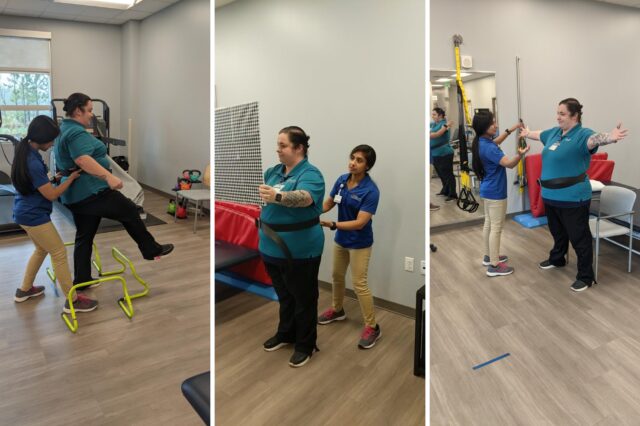Neurological Physical Therapy
Neurologic physical therapy is a specialty within physical therapy for the rehabilitation of the nervous and musculoskeletal systems.

What is neurologic physical therapy?
Neurologic physical therapy is a specialty within physical therapy for the rehabilitation of the nervous system and the correlated musculoskeletal system. This specialty achieves this rehabilitation through creating physiological changes to improve mobility, activities of daily living, balance, endurance and cognition.
The neurologic system includes the brain, spinal cord, and the nerves as they leave the spinal cord and attach to the muscles. It is a vital component for our everyday mobility.
When injuries occur in this system, the muscles associated with them can lose strength, lose coordination of gross and fine motor skills, become tight, have a loss of sensation, and even develop tone and spasticity. Without a functioning neurologic system, a person’s ability to stand, walk, balance or engage in basic needs of dressing, bathing and house chores are impaired. Higher level mobility such as sports can become more challenging.
It is the goal of neurological physical therapists to improve these aspects of a person’s quality of life through the concept of neuroplasticity of the brain, spinal cord and associated nerves. It can also improve muscle strength, range of motion, endurance, balance, coordination and stability.
What is neuroplasticity?
Neuroplasticity is the ability of the nervous system to change its activity in response to internal or external stimuli by reorganizing its structure, functions or connections after injuries. This can be either positive, such as engagement in appropriate stresses on the body, or negative, such as causing a weakening of the neurologic system.
The nervous system is like a piece of clay that can be molded and changed into something more useful. However, over time it is harder to be remodeled. Neuroplasticity can best be achieved immediately after an injury, which is why therapy is needed early after an injury or a change has occurred.
What should you expect from neurologic physical therapy sessions?
A neurologic physical therapy session will begin with a thorough examination of impairments or difficulties to your mobility and setting up patient-specific goals. After the initial examination, treatments will begin that will address your deficits and be guided toward your goals.
Your therapist will provide a home exercise program important for your recovery goals. Your home exercise program should progress as you move through therapy.
You should expect to be challenged in therapy. For example, if you have balance issues, you should feel like you are about to experience a loss of balance during your sessions. Despite these sensations, safety will be maintained and is the upmost importance in the sessions.
What kind of conditions do neurologic physical therapists work with?
Neurologic physical therapists are skilled in the treatment and management of a variety of neurologic conditions, such as:
- Balance disorders
- Concussions
- Difficulty with walking
- Guillain-Barre' syndrome
- Multiple sclerosis
- Parkinson’s disease and other movement disorders
- Seizures
- Spinal cord injuries
- Stroke/CVA
- Traumatic brain injury
- Vestibular dysfunction and dizziness
When should you see a neurologic physical therapist?
If you notice a change in your mobility or receive a new diagnosis, a referral to a neurologic physical therapist can be helpful to assist with improving your mobility and prevention of further loss. Some conditions also require regular tune-ups done annually or when changes are noticed.
For more information about rehabilitation services at UF Health Jacksonville visit UFHealthJax.org/rehab.